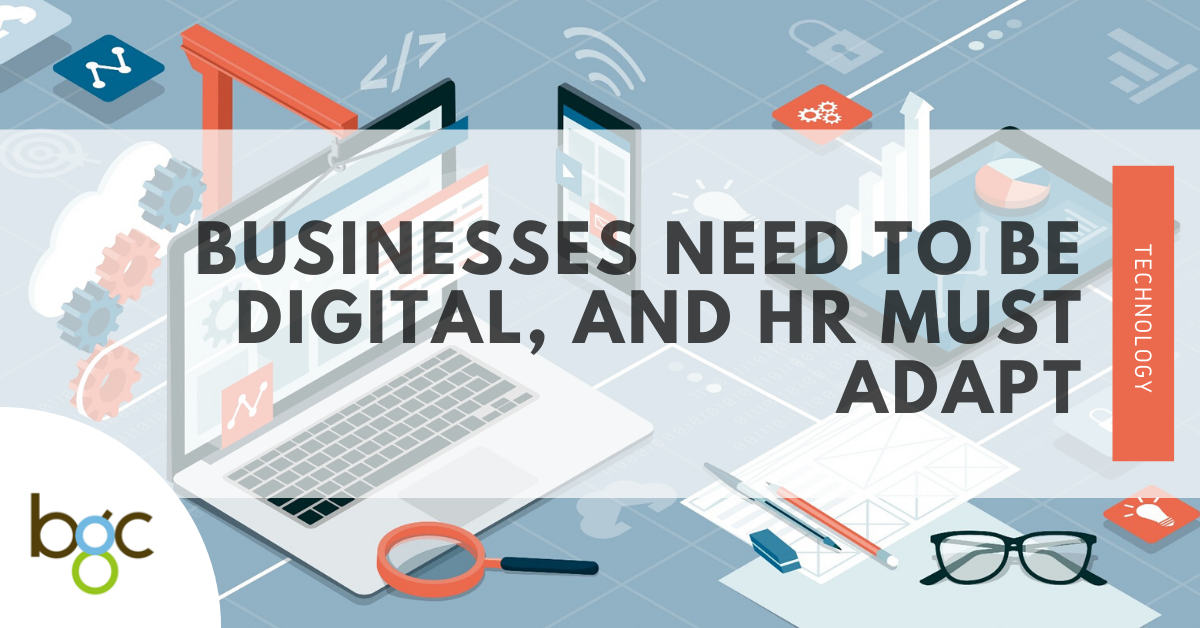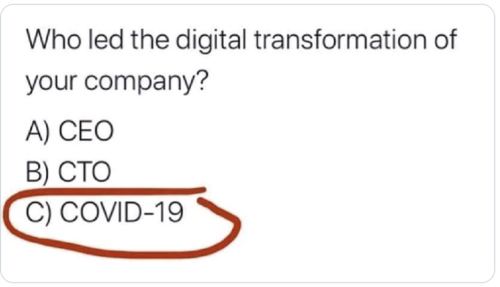Technology is Now Our New 'Normal'
2020: The meme that sums it all. Source: Forbes
The Digital Age is the here and now. Organisations big and small alike are pushed to adopt digital transformation way ahead of schedule amid the Covid-19 coronavirus pandemic. In less than a century, digital has revolutionised how various sectors operate globally as new technological thresholds are being crossed. Only by adopting digital best practices can the playing ground for new businesses and global brands alike be levelled.
Our 'New Normal' brings about novel ways for companies to operate and service customers, and it calls for new skills that the current workforce has to pick up. The Digital Age is commonly associated with drastic change and overhaul of the old ways. Many traditional companies fear such changes - as the saying goes, “Don’t fix what isn’t broken.” Companies who get left behind are those who do not embark on this urgent digitalisation journey.
A classic example of the past includes Kodak, a fatality of an anti-digitalisation mindset. Then, it was the very company that could have pioneered the digital camera with the patent they have, but decided not to for fear of self-cannibalisation. Fixated on what they believed to be their key product (film), Kodak turned a blind eye to the potential that digital cameras could bring. This narrow mindset led to their bankruptcy when digital cameras boomed, when they could have led the market introduction of the digital camera but failed.
Digital Transformation Will Be Ongoing
Getting Over Digital Transformation: Different stages of change. Source: Daily Mail
Many organisations may feel threatened by digital transformation as traditional business processes and methodology makes way for new technologies and processes. Development of advanced technology, such as Artificial Intelligence (AI) programs to take on the workload of numerous administrative job functions is a concern for job stability.
This change is inevitable and companies need to embrace innovation rather than looking at it in a “Man vs Machine” situation. With workers freed from their administrative duties, they can redirect their attention to tasks that add value with a more delicate, human touch. Technologies are here to provide an outlet for increased collaboration between multiple departments and companies. Take for example, the app Slack - an online platform that many workplaces are adopting due to its seamless integration of many key 3rd party software such as Google Drive. It is also a communication hub that allows people throughout the company, regardless of department, to talk and collaborate in projects with one another.
How HR Can Take Charge & Lead Change
Digital Transformation as part of change management. Source: Edinburgh Napier University
We have three tips to kick start the process:
1. Do things smarter within the HR function
How HRs are spending their time. Source: PwC
Learn Smarter
Organisations have to grow and maintain their knowledge base to keep up with evolving digital technologies of various departments. And as the gatekeepers of the company, HR needs to recognise this as a company-wide project that requires the involvement of departments. The learning and development arm should be updated of each department’s learning needs and notify them on opportunities for upskilling for the digital age. This can be done by looking at the latest technological reports or exploring online open-source communities to identify potential growth areas within the company.
Hire Smarter
Each company should maintain its knowledge base through learning and researching. And an easier way to achieve that goal? Partnering with experts hired in that field. Partnering their digitally savvy co-workers is a great way to spearhead digitalisation efforts within the organisation. However, with an IT talent shortage in Singapore, there are some key pointers for HR to keep in mind when recruiting in the Digital Age.
To tackle this, HR and Talent Acquisition functional teams in Singapore are increasingly looking to:
Adopting the services of IT specialist recruitment firms in Singapore. Recruitment manpower outsourcing agencies like BGC Group and A Very Normal Company have recruiters with the network and expertise in their specific industries to source the most suitable employees with skill sets to handle digital transformations. Ideally, the company and the recruitment firm would keep strong ties such that the external recruiter understands the company’s culture and are kept up to date on their needs. This arrangement ensures that recruiters are constantly looking out for suitable candidates that the client may not even know that they are looking for.
Innovative and creative minds hired through this process ensure positive contribution towards a culture of innovation. Employers should also consider taking full advantage of government grants to assist in training and developing their current technological talent pool. Programmes to consider include:
2. Work processes must become more efficient
Continuous Improvement. Source: Leankit
People change and evolve their methods of communications over time and HR systems would do well to be able to efficiently establish strong communication channels with their employees in a employee-centric strategy that helps communication flow. With a strong strategy in place, the company as a whole can collectively orient itself towards a customer-oriented strategy that takes advantage of technology. Not only does this streamline and refine business processes for the company, the company can also grow and maintain its customer base with a solid customer experience.
3. Practice cultures that encourage creativity and innovation
Source: Valueships
Digital Transformation: Challenge Accepted?
Change may be frightening to many, but the benefits of change will seek to make things easier in future. Companies should see this as a step towards success and embrace it. HR professionals play an important role in facilitating digitalisation efforts to help their company grow in the right direction.
HR has three focus areas to challenge themselves with when embarking on digitalisation- to grow the company’s knowledge base through:
the acquisition of experienced talents
upskilling and reskilling exisiting talents to improve on the company’s efficiency
thoroughly examining and restructuring processes build up a culture of innovation.
Recommended Reads:
Top Essential Digital Skills That All Employers Need in Singapore
Adapt or Die: 6 In Demand Skills for Singapore's Digital Banking Future
Top Essential Digital Skills That All Employers Need in Singapore
4 Reasons Why Tech and IT Employees in Singapore Leave Their Jobs






